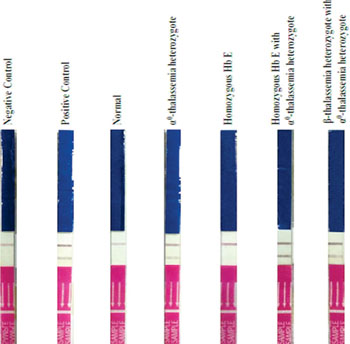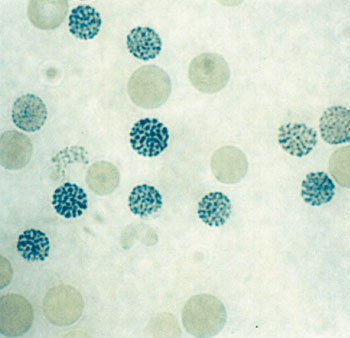Immunochromatographic Strip Endorsed for α-Thalassemia Screening
By LabMedica International staff writers
Posted on 20 Nov 2014
Thalassemia is an autosomal recessive inherited genetic disorder of the red blood cells causing by reduction or absence of one or more globin chains of hemoglobin (Hb) molecules.Posted on 20 Nov 2014
An immunochromatographic (IC) strip test has been developed for rapid screening of α0-thalassemia by testing for Hb Bart’s in blood samples using a specific monoclonal antibody against Hb Bart's.
Molecular Bioscientists at the Mahidol University, Nakhonpathom, Thailand) working with their Australian colleagues, collected a total of 662 routinely leftover anticoagulated blood samples, 411 from Thailand and 251from West Australia and included in a multicenter study. Hematologic data were determined by the automatic blood cell counters being operated at individuals laboratory collaborated in this multicenter study.
Polymerase chain reaction (PCR) was used to identify α0-thalassemia, α+-thalassemia, Hb H disease and non-deletion α-thalassemia in most samples. In two laboratories α-thalassemias were detected by the presence of erythrocyte Hb H inclusion bodies using the enriched young red cells from just below the buffy coat. A modified Alpha Thal IC strip test (i+MED Laboratories, Bangkok, Thailand) for screening of α-thalassemia was also tested.
There were 45 samples with α-thalassemia traits and were demonstrated to have the α0-thalassemia gene, 18 were from Hb H and EA Bart’s disease patients and 15 were homozygous α+-thalassemia or compound heterozygous α+-thalassemia and non-deletion α-thalassemia. All of these samples showed strongly positive results with IC strip test except for two α0-thalassemia samples, which had the negative results and were accounted for as false negatives. Among the 180 samples with normal α-globin genotyping the IC strip test revealed 97.8% negative reactivity.
The authors concluded that in combination with red blood cell indices, the IC strip test could rule out mass populations for further α0-thalassemia detection by PCR-based analysis. The established IC strip test has an advantage since it does not require sophisticated equipment, easy to perform and the result can be visually interpreted without an expert. It is also less-time consuming and can be done with a large number of samples, and therefore the IC strip test can be applied in thalassemia screening program, which will reduce the need of expensive PCR methods in the inappropriate cases for diagnosis of α0-thalassemia carriers. The study was published on November 6, 2014, in the journal Translational Research.
Related Links:
Mahidol University
i+MED Laboratories















